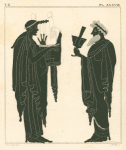Music.
From the solemn chant of 'Sanctus' to the mumbled love song set to the two and a half guitar chords that her boyfriend learned on the cold evening of February 13, it structures our lives. We listen to it in the car, singing our hearts out, play it in bands of greater or lesser caliber, practice until fingers bleed and that arpeggiation is pristine. It is in our movies and our malls, our pockets and our cathedrals. It will bring us to weep, to laugh, to dance, to worship, and it will ignite our hearts to love.
Music is the purest form of communication. Chant, in its purest sense (speaking in tone) is a sort of poetry beyond any literary structure. Harmony exists as the deepest and most inherent expression of human collaboration. Oh, where does music take us? Is it proactive or simply a sideshow to our lives? Why do we love it so much, and why, when we hear it floating softly over the walls of our fears and insecurities, do we come calmly out of ourselves to hear the truth and dance?
_-_Foto_G._Dall'Orto.jpg/300px-DSC00355_-_Orfeo_(epoca_romana)_-_Foto_G._Dall'Orto.jpg)
Long ago, in central Greece, the Muses stood upon the Mount Parnassus, the mountain of Poetry and Art. A small boy Orpheus was born and resided upon this mountain. One day in his youth, he came across Apollo, the god of the sun, of dreams and of reason, as he was courting the laughing Muse Thalia. Apollo handed the boy a golden lyre and taught him to play. The boy's mother taught him the creation of verses for singing. He is now called the "Father of Songs", a great prophet and musician, and is sacred to both Apollo and Dionysius, the god of ecstasy, passion, and intoxication. So inspired was his singing that nature flowed in harmony with his song and thrown rocks and sticks refused to hit him, the only musician to ever melt the heart of Hades. He, by his old age, began to turn away from all gods save that of the sun, Apollo. His death came soon, however, brought by the servants of Dionysus, angered that Orpheus refused to respect the patronage of the God of passions and ecstasy. Still today, the two peaks of the mountain Parnassus are each devoted to one - Apollo and Dionysus.
 |
Sometimes a little bit
of Truth makes it out
through all that hair. |
 My word, do we have much to learn from the Greeks. Apollo and Dionysus, metonymically demonstrating these two great elements of human consciousness, have been used to illuminate great depths of the aesthetic theory of philosophers from the Greeks to octopus-face over here. Any Apollonian act, we learn, is an act of reason and of greater thought, while anything Dionysian flows from the basal desires and passions. Apollonian meter, rhyme, and lyricism meets the Dionysian rhythm and timbre. These elements drive all human action and thus, they drive music..
My word, do we have much to learn from the Greeks. Apollo and Dionysus, metonymically demonstrating these two great elements of human consciousness, have been used to illuminate great depths of the aesthetic theory of philosophers from the Greeks to octopus-face over here. Any Apollonian act, we learn, is an act of reason and of greater thought, while anything Dionysian flows from the basal desires and passions. Apollonian meter, rhyme, and lyricism meets the Dionysian rhythm and timbre. These elements drive all human action and thus, they drive music..
Even Nietzsche recognizes that "development of art is bound up with the duality of the Apollonian and the Dionysian, just as reproduction depends upon the duality of the sexes" (The Birth of Tragedy). Our reason and our dreams, our contemplation is bound up with our deeper emotions, our ecstasies and depressions, mourning and passion--the Apollonian is bound to the Dionysian.
 Look for a moment upon the Sacred Heart of Jesus and see the thorns, the blood, the tears. Look upon his face and see his pain, and think upon the choice made to love, to sacrifice--his entire person in service of our souls. In the garden,
Look for a moment upon the Sacred Heart of Jesus and see the thorns, the blood, the tears. Look upon his face and see his pain, and think upon the choice made to love, to sacrifice--his entire person in service of our souls. In the garden,
He said to them, "My soul is sorrowful even to death."... He advanced a little and fell to the ground and prayed that if it were possible the hour might pass by him; he said "Abba, Father, all things are possible to you. Take this cup away from me, but not what I will but what you will."
"Give glory to your son that your son might glorify you," he prays, and never has there been a greater act of worship. He confesses his desires and his pains, and through them, stands upon reason--there will never be a deeper hymn sung to the Father.
And we hear in Revelation of the choirs of Heaven, that Heaven is eternal song. The entire person is called to action. In every moment on Earth and in Heaven, the presence of grace draws us forward such that every action is in unity with Christ's sacrifice.
Music, then, in it's fullest sense, takes into account our emotions, flows from our hearts, and glorifies our
passions in our use of reason. We place ourselves within a ship with solid hull, and we fly upon the waters, secure through greatest drama of life with our hand firmly and reasonably on the helm. This music deserves, therefore, our entire selves and our practice and concentration. Music must be good and beautiful, bringing honor to ourselves and to our purpose. Music is a sacred art, sacramentalizing the music of Heaven in our lives (don't worry, we'll talk about that more later), and no artist has any excuse for making bad art. The gift of music necessarily predicates a respect for its potential and valued.
Music also calls us to authenticity. If Christ prays forth his agony until "his sweat became like drops of blood falling upon the ground," we have no reason to write the Christian rock songs about how 'everything sucked until Jesus showed up and now I'm always happy'. That's not how Christ's life went, and it's not how our lives go with Christ. Music makes sense out of our desolation (Apollonian and Dionysian, remember?), making a real difference in our ability to bear it. Music, in its truest sense, is prayer.
As Marc and I (I'm Daniel, by the way) continue to speak from our experience of music and from the knowledge which many smarter and holier people have shared, we will attempt to realize these truths. We will attempt to nail down the practice and lifestyle of music as well as the types and roles of music, especially in the specification of congregational music. We will attempt to share the music which we have found to match the expectations of Art and of Platonic aesthetics, thus flowing into Thomistic beauty, demonstrating bands which make good and holy music. Expect posts soon on Mumford and Sons, on Christian Rock, and much more.


.jpg)





_-_Foto_G._Dall'Orto.jpg/300px-DSC00355_-_Orfeo_(epoca_romana)_-_Foto_G._Dall'Orto.jpg)


